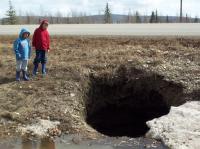The study by the Institute for Social and Economic Research at University of Alaska is the first of its kind in Alaska, and it does not project costs for things like moving villages, protecting the Trans-Alaska Pipeline, fighting wildfires or protecting private property that may be affected.
Temperatures have risen by an average of two to five degrees in different parts of the state in recent decades, and the changes have already been linked to problems like coastal erosion in remote Alaskan villages and wildfires. The researchers who wrote the report said their estimates for increased costs were based on “middle-of-the-road” forecasts for warming in a place where projects were designed to endure the cold.
“There are a million other issues related to climate change,” said Peter Larsen, lead researcher for the report. “This is just one component, but it’s a critical piece because this is where all the goods and services come through the state’s economy, is through the infrastructure.”
Subscribe to our newsletter
Stay up to date with DeSmog news and alerts






